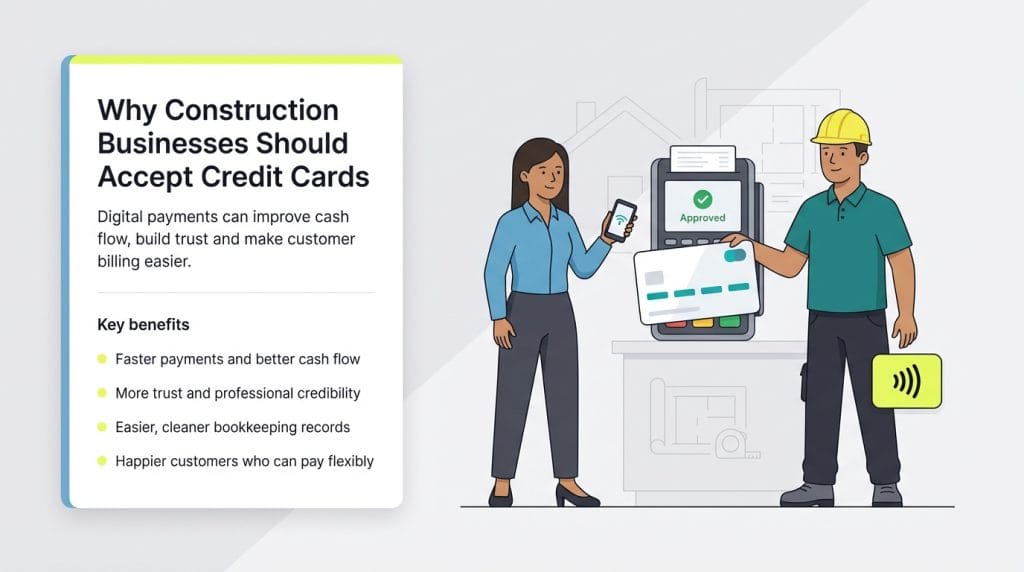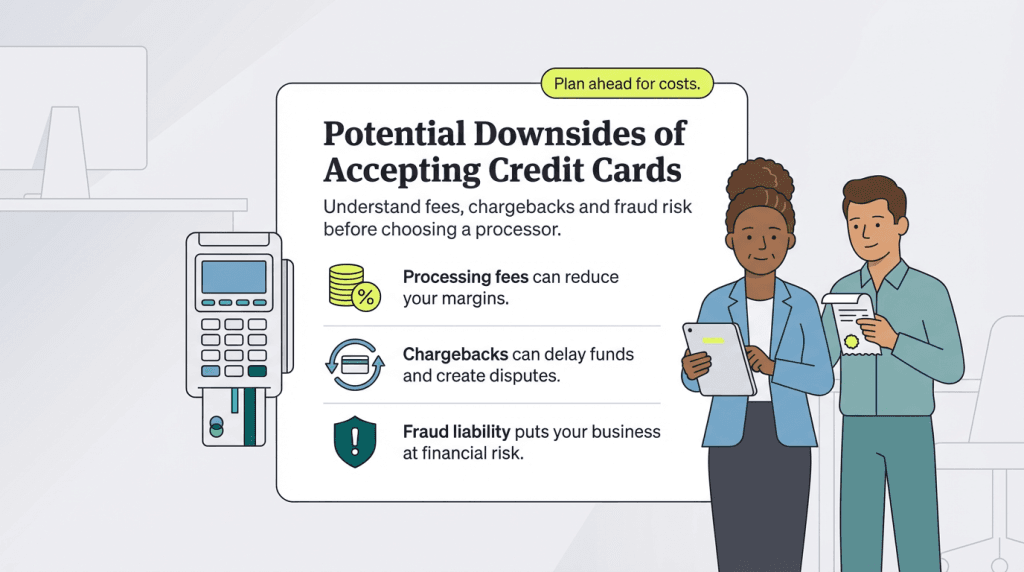Accepting credit cards as a construction company can help to get paid faster and earn more business. Below, we’ll explain the benefits of accepting card payments and provide tips for successfully expanding your payment options.
Why your construction company should accept credit cards
Here are the benefits of accepting credit cards at your construction business.
It’s convenient for your customers.
Most people don’t carry enough cash to cover large expenses. With card payments, customers can quickly pay you in person, over the phone or online.
Credit cards enable customers who don’t have the full amount available yet to pay it back over time. Plus, your business gets paid sooner because you won’t have to wait for customers to obtain the funds.
“Modern construction companies must offer credit card payments, as customers increasingly expect this convenience,” said Rodney Hakimi, owner of Maryland-based general contracting company Prime Renovations.
It conveys credibility.
Failing to accept credit cards may make your business appear less credible, leading to a loss of trust. That’s because credit cards provide consumer protections and serve as proof of the transaction. Accepting them also helps businesses avoid bounced checks, check fraud and other risks.
Displaying credit card logos on your website and at your business can increase trust with clients and show that your company is legitimate.
It’s fast.
Credit cards process immediately, allowing you to start new projects without waiting for a check to clear. You may even be able to schedule recurring payments or installments that automatically charge your customer’s card, ensuring regular cash flow as long as the job is on schedule.
It makes bookkeeping easier.
Card payments create a digital record of purchases, streamlining the accounting process and reducing the potential for manual errors. If there is a problem with your customer’s card payment, you’ll know immediately.
According to Hakimi, accepting card payments can help “improve cash flow and, above all, reduce the risk of bounced checks.”
It can increase your bottom line.
A smooth payment process can increase positive word of mouth for your business, giving you a competitive edge over companies that only accept cash and checks.
Customers can also earn cash-back rewards when paying with a credit card, which may encourage them to spend more at your business.
“Credit cards offer flexible payment terms that reflect a customer’s buying power,” said Clark Lowe, president and CEO of North Carolina-based nonresidential construction firm O’Connor Company. “Some customers may use cards for their added benefit in points or take advantage of friendly payment terms at low interest rates.”
Potential downsides of accepting credit cards
If you have concerns about accepting credit cards, there are steps you can take to mitigate or prevent potential drawbacks.
Fees
Credit card payments incur a processing fee of approximately 1.5 to 3.5 percent of each transaction, which could reduce profits.
While most credit card companies take a percentage fee for processing payments, determining who is responsible for paying that fee may become a point of contention, Lowe said.
Build this expense into your margin while offering a discount for alternative payment methods. Some businesses opt to charge a convenience fee for accepting card payments, but be cautious, as this is illegal in several states.
If your fees are high, consider negotiating a lower price or shopping around for a cheaper provider.
Risk of chargebacks
A charge-back occurs when a customer disputes a charge, typically resulting in the withholding of funds until the dispute is resolved. Avoid chargebacks by clearly stating your payment policy and maintaining detailed records of each transaction.
Document your work with photographs and conduct quality assurance checks with your customers. Walk them through the work you’ve completed and have them sign off on it, stating that the work is finished and meets their approval.
It increases fraud liability.
Banks may seek reimbursement if a business owner authorizes charges made with a stolen credit card. Additionally, the processing account may be terminated, which can result in the merchant’s business being rejected by other processing firms.
Business credit cards for construction companies
Some credit cards are better suited for construction companies, including:
- American Express’ Blue Business Plus
- Capital One’s Spark
These two cards, designed specifically for business owners, offer numerous perks for cardholders, including cash bonuses and expense management services.
Tips for successfully expanding your payment options
These best practices can increase your chances of success when accepting credit card payments at your consyrutionm company:
- Do your research. “Weigh the benefits of accepting all payment types,” Lowe advised. “Consider not only the risks each payment method has but also the risks each payment method may mitigate or eliminate.”
- Do a test run. Implement a pilot program to test the payment methods you wish to accept, Hakimi suggested. “As business owners, you can select a small group of loyal and valuable clients to test credit card payments before implementing [them] widely,” Hakimi said. “This way, you will be able to identify any other risks or drawbacks.”
- Choose a card for your industry. Hakimi recommended partnering with a payment processor that offers industry-specific solutions to ensure you get the best rates and features for your business. [Read more about choosing the best credit card payment processor for your construction company.]











